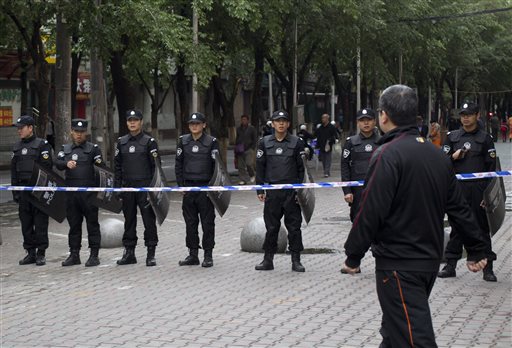URUMQI, China (AP) — A blast that killed 31 people in China’s restive Muslim northwest left ethnic Chinese residents on edge Friday about sporadic violence from which they no longer felt safe.
“The danger is right here with us and we dare not go out,” said the daughter of a 70-year-old woman who was hospitalized with a broken hip after Thursday’s bombing at a vegetable market. She refused to give her name.
The attack was the Xinjiang region’s bloodiest single act of violence in recent history and the second in two months in its capital city. A bombing at an Urumqi train station in April killed three people and injured 79.
There was no claim of responsibility and authorities released no details Friday of an investigation led by China’s police minister.
Authorities have blamed other recent violence on separatists from the Muslim Uighur ethnic minority that is native the Xinjiang region. Beijing has claimed groups in Xinjiang are linked to Islamic terrorist movements abroad but foreign experts say they see little proof of that.
A foreign ministry spokesman appealed for international condemnation of the attack, which also wounded at least 90 people.
“These terrorists, whatever their purposes, will not possibly have their way,” said the spokesman, Hong Lei, in Beijing. “We hope the global community can join China in the condemnation and fight against terror.”
Uighur activists say an influx of settlers from the dominant Chinese Han ethnic group and discriminatory policies toward minorities are fueling anger and violence. The knowledge that Muslims elsewhere are rising up against their governments also seems to contribute to increased militancy.
On Friday, security was tightened around the bombing site but life in most of Urumqi went on normally.
The market where Thursday’s attack occurred was closed and dozens of police armed with automatic rifles and body armor stood guard. Authorities banned parking within 100 meters of schools throughout the city and said drivers could stop only briefly outside hospitals and train or bus stations.
Witnesses said the attackers in two SUVs drove through crowds of people shopping at the vegetable market and threw bombs that knocked people off their feet.
“The SUVs were mowing down people and goods alike,” said a 71-year-old woman who gave only her surname, Zhang. She was hospitalized with crushed toes and other injuries. “It is not safe here anymore. We don’t have a sense of security.”
Zhang spoke to The Associated Press in a four-bed ward guarded by armed police at Urumqi’s Traditional Chinese Medicine Hospital. Soon after, doctors and nurses ordered reporters to leave.
Another woman, who would give only her surname, Li, was working at a public scale when she was knocked off her feet by one of the speeding SUVs and broke her hip.
“It was so fast it was like a plane flying,” Li said.
Recent attacks show an audaciousness and deliberateness that wasn’t present before. Attackers are increasingly going after civilians rather than police and government targets.
Last month’s train station attack in Urumqi occurred as Chinese President Xi Jinping was visiting the region, usually a time when security is at its tightest. Three people including two attackers were killed and 79 people injured.
Security in the city has been stepped up since then.
Prior to the train station attack, Urumqi had been relatively quiet since the 2009 ethnic riots amid a smothering police presence. The sprawling metropolis’ population of more than 3 million people is about three-fourths Han Chinese.
In March, 29 people were slashed and stabbed to death at a train station in the southern city of Yunnan. The attack was blamed on Uighur extremists bent on waging jihad.
The increasing frequency of attacks shows growing frustration among Uighurs over government policies seen as discriminatory, said Raffaello Pantucci, a terrorism expert at the Royal United Services Institute for Defense and Security Studies in London.
“The issues are not getting resolved, and in some ways are getting worse,” Pantucci said. “People are left feeling they have no hope.”
___
Associated Press writers Christopher Bodeen in Beijing and Aritz Parra and Andy Wong in Urumqi contributed.

COMMENTS
Please let us know if you're having issues with commenting.